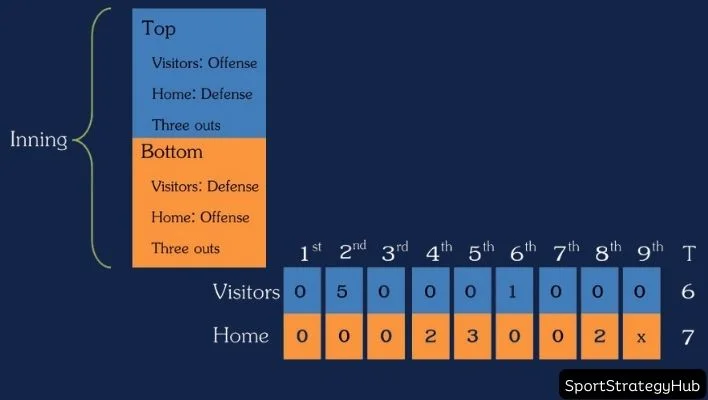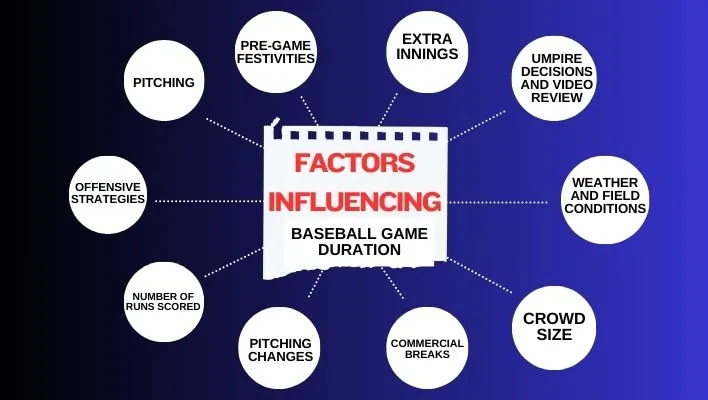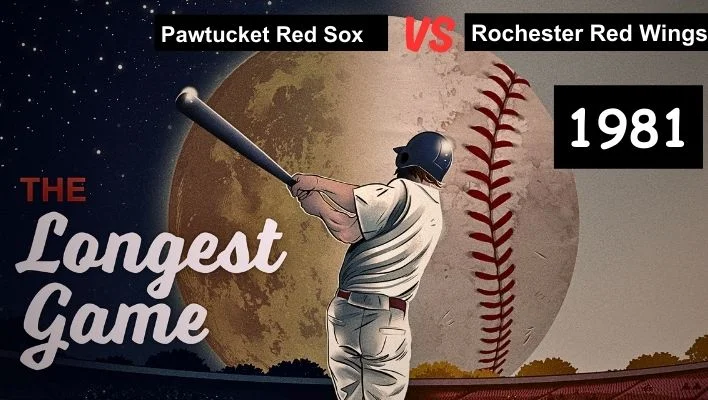How Long Are Baseball Games: Average Length of MLB 2024
Are you curious to know How long are baseball games?. Welcome you are at the right place. These encounters last about three hours on average, but various factors can extend or shorten the game. This variability not only adds an element of suspense but also deepens the game’s strategic aspects. The real intrigue, however, lies in what these hours can unfold. From nail-biting finishes to historic plays, baseball holds countless stories in each game. But what truly makes some games stretch beyond the ordinary, turning an afternoon into an epic saga? The answer might surprise you and change how you view America’s favorite pastime.
How Long Is a Baseball Game in 2024?

As we step into the year 2024, it’s important to note something interesting. The duration of baseball games has been a topic of discussion in recent years. The Major League Baseball (MLB) has made efforts to address game length and improve the pace of play.
This clock allows a specific amount of time for each pitch, aiming to reduce the time between plays. As a result, the average game time has seen a reduction of about 30 minutes. Games now last around 2 hours and 40 minutes.
It’s worth mentioning that the pitch clock’s introduction is just one of several measures. These steps were taken to enhance game flow and shorten game duration. The MLB consistently assesses and adapts its rules. This effort aims to achieve a balance between upholding the game’s integrity and ensuring fans have an engaging experience.
The Average Length of a Baseball Game
To comprehend the typical duration of a baseball game, it’s necessary to explore the inherent structure of the sport. Unlike sports with set game clocks, such as basketball or football, baseball has no strict time limit. In professional baseball, a game is made up of nine innings. Each inning is divided into two halves, known as the ‘top’ and ‘bottom’ of the inning. The length of each half-inning depends on the field action and can vary. Factors like pitching changes, offensive strategies, and the number of runs scored influence this variation.
Statistical data from previous seasons shows that the average duration of a nine-inning MLB game is approximately three hours and ten minutes. It’s important to understand that not all games follow this average length. Things like close pitching battles, high-scoring games, and extra innings can make a game last longer than usual.
See Also: How Many Baseballs Are Used in a Game
How Many Innings in Baseball?

In baseball, teams take turns batting and fielding for nine innings in a standard professional game. The away team bats first in the top half of each inning, and the home team bats in the bottom half. If the home team is winning after the top of the ninth inning, the game ends without the need for the home team to bat again.
However, in certain situations, such as tied games after nine innings, the game can extend into extra innings. Extra innings occur when both teams have had an equal number of opportunities to bat and field for nine innings, but the game remains tied. In such situations, the game carries on until there’s a winner, with both teams taking turns batting and fielding in additional innings
It’s important to note that the number of innings can vary in different levels of baseball, such as high school or little league. While professional games consist of nine innings, high school games typically have seven innings, and little league games may have fewer innings depending on the league’s rules.
How Long Does a Baseball Inning Last?
A baseball inning’s length can vary due to multiple factors. Typically, in professional games, an inning lasts about 16 to 18 minutes, but this can change based on various actions during the inning. Factors like pitching changes, offensive tactics, and the number of runs scored can all affect how long an inning lasts. For example, if a pitcher struggles and allows multiple runs, the inning may last longer as more batters come to the plate. Conversely, if a pitcher quickly retires the opposing team’s hitters, the inning may be shorter.
It’s important to note that how quickly the game moves can affect how long an inning lasts. If both teams adopt a fast pace, with minimal timeouts and quick transitions between plays, the innings may progress swiftly. However, if there are frequent timeouts, defensive shifts, or delays between pitches, the inning can stretch out.
See Also: How many baseball players on the field
How Long Are MLB Baseball Games?
MLB baseball games, consisting of nine innings, typically last around three hours and ten minutes on average. Yet, it’s crucial to understand that specific games may vary greatly from this average. Elements like intense pitching matchups, high-scoring contests, and extra innings can prolong games beyond the norm. To address this, Major League Baseball (MLB) has taken steps to enhance pace of play. Notably, they’ve introduced a pitch clock to shorten the time between pitches.The pitch clock was first introduced in the minor leagues and has shown promising results in reducing game times. It is expected that the pitch clock will eventually be implemented in the major leagues, further contributing to shorter game durations.
Additionally, the MLB continues to evaluate and adjust rules to ensure an enjoyable experience for fans while maintaining the integrity of the game. These efforts aim to strike a balance between game length and engaging gameplay.
How Many Innings in High School Baseball?
High school baseball games usually have seven innings, which is different from professional games that have nine innings. The shorter duration of high school games is primarily due to various factors, including limited time availability and the need to accommodate multiple games on the same day.
The seven-inning format helps maintain a more manageable schedule and ensures games can finish within a reasonable time. While the number of innings is reduced, the essence of the game remains intact, providing players with an opportunity to showcase their skills and compete on the diamond.
It’s important to note that the rules and regulations may vary in different regions and associations, so it’s always advisable to consult specific league guidelines for accurate information regarding the duration of high school baseball games in a particular area.
See Also: How Many Games in Baseball
How Long Does a Little League Game Last?
Little League games, designed for young baseball players, typically have a shorter duration compared to professional or high school games. The length of a Little League game can differ based on the age group and league rules. Typically, Little League games have six innings, lasting approximately 15 minutes each.
The shorter duration of Little League games ensures that young players can participate fully, maintaining their focus and enjoyment throughout the game. By reducing the length of the game, Little League aims to provide a more manageable experience for young athletes while still allowing them to develop their skills and understanding of the sport.
It’s essential to recognize that rules and regulations may differ among various Little League organizations and age categories. Local league guidelines should be consulted to obtain accurate information regarding the duration of Little League games in a particular area.
How Long Is a Minor League Baseball Game?
Minor League Baseball games, similar to those in the major leagues, are played over nine innings. However, minor league games tend to have a slightly shorter duration compared to major league games. On average, minor league games last around two hours and 45 minutes.
The shorter length of minor league games can be attributed to several factors. One significant factor is the absence of extended commercial breaks, which are more prevalent in major league games. Additionally, minor league games may have fewer pitching changes and shorter delays, contributing to the overall decrease in game length.
It’s worth mentioning that the actual length of a minor league game can vary based on the level of competition, the teams’ competitiveness, and other factors. However, minor league games offer a fantastic opportunity for fans to experience the excitement of professional baseball in a more condensed time frame.
See also: How Many Bases are in Baseball
Factors Influencing Baseball Game Duration

Numerous factors can impact the length of a baseball game. Let’s examine some key contributors to its duration:
Pre-Game Festivities
Pre-game festivities like ceremonies, introductions, and entertainment elements might slightly affect the duration of a baseball game. Although they enhance the fan experience, they generally don’t significantly extend the gameplay time. Ceremonies and introductions before the game, including the national anthem and player announcements, are usually brief and well-managed.
Pitching
The performance of pitchers can significantly impact the duration of a baseball game. Pitching changes, mound visits, and the pace at which pitchers work can influence the flow of the game. If pitchers consistently throw strikes and retire batters efficiently, the game’s pace is likely to be faster. Yet, if pitchers have control issues or there are frequent pitching changes, the game can slow down.
Offensive Strategies
The offensive strategies used by teams can impact the length of a baseball game. For example, teams that focus on patient at-bats, working deep into counts, and drawing walks can extend the duration of the game. Conversely, teams that adopt an aggressive approach, swinging early in counts, and putting the ball in play quickly can expedite the game.
Number of Runs Scored
The number of runs scored during a game can also affect how long it lasts. High-scoring games with multiple runs scored by both teams tend to be longer due to increased offensive action. Conversely, low-scoring games where runs are scarce can progress more quickly, with fewer offensive opportunities and shorter innings.
Pitching Changes
Pitching changes, particularly in critical situations, can have a significant impact on game duration. When teams make frequent pitching changes, it can lead to longer breaks between pitches and slower game flow. Nevertheless, strategic pitching changes can also bring excitement and strategic complexity to the game.
Commercial Breaks
Commercial breaks during televised baseball games can extend the overall duration of a game. These breaks allow broadcasters to air advertisements, providing revenue for the sport. While commercial breaks are an essential aspect of televised games, they can contribute to the length of a game, particularly if there are numerous breaks throughout the broadcast.
Crowd Size
The size and engagement of the crowd can also influence game duration. Larger crowds often lead to more intense and passionate atmospheres, resulting in longer breaks between plays. Additionally, crowd reactions, such as standing ovations or delays caused by fan interference, can contribute to the overall length of a game.
Weather and Field Conditions
Weather conditions, such as rain delays or extreme heat, can impact game duration. Inclement weather may result in game delays or even postponements, ultimately extending the overall duration. Additionally, field conditions, such as wet or poorly maintained surfaces, can affect the pace of play and contribute to longer game times.
Umpire Decisions and Video Review
Umpire decisions and video review can also influence the duration of a baseball game. Umpires play a crucial role in making calls on the field, and their decisions can lead to discussions, arguments, and delays.Furthermore, the introduction of video review in recent years has added an extra layer of complexity to the game, potentially extending game time with reviews and challenges.
Extra Innings
When a baseball game extends into extra innings due to a tie score after nine innings, the duration of the game naturally increases. Extra innings continue until a team emerges as the winner, adding additional playing time and potentially extending the overall duration of the game.
The Longest Game Ever in Baseball History
Throughout the history of baseball, there have been some exceptionally long games that have etched their names in the record books. In 1981, a remarkable game took place between the Pawtucket Red Sox and the Rochester Red Wings. This minor league match lasted an astonishing 33 innings, lasting over 8 hours and 25 minutes. It was so lengthy that it had to be played over two consecutive days.

The longest major league game occurred in 1984 between the Chicago White Sox and the Milwaukee Brewers. This 25-inning marathon lasted for 8 hours and 6 minutes, setting the record for the longest game in MLB history in terms of time.
These exceptional games showcase the endurance and resilience of both players and fans. While such extended contests are rare, they contribute to the rich history and lore of the game.
See Also: How to score a baseball game
FAQs
Baseball games can be longer than other sports due to various factors, including the absence of a game clock, the strategic nature of the game, and the potential for extra innings. Moreover, longer game durations can be influenced by factors such as pitching changes, offensive strategies, and commercial breaks.
Baseball does not have quarters like sports such as basketball or football. Instead, baseball games consist of nine innings, with each inning divided into halves.
The pace of play in baseball, combined with the absence of a game clock, can make games seem longer compared to other sports. The strategic nature of baseball, with its focus on pitcher-batter matchups and game management, can contribute to a slower pace and longer game durations.
Certainly, adverse weather conditions like rain or extreme heat can affect the length of a baseball game. Weather delays or interruptions can extend the overall length of a game.
Yes, the MLB has implemented various rule changes and innovations in recent years to address game length and improve the pace of play. These changes include the introduction of a pitch clock, limited mound visits, and other measures aimed at expediting the game.
Conclusion
The length of a baseball game can vary depending on several factors. The average length of a professional baseball game is around three hours, but individual games can deviate significantly from this average. Elements such as pitching, offensive strategies, the number of runs scored, and other game dynamics can impact the duration of a game. Additionally, external factors like weather conditions, umpire decisions, and commercial breaks can impact game duration. While baseball games may seem longer compared to other sports, the timeless traditions and excitement they offer make every minute worthwhile. So, grab your peanuts and cracker jacks, settle into your seat, and enjoy the timeless magic of America’s favorite pastime.
See Also: How Long Is a Basketball Game
